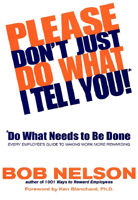 |
| ||||||||||||||||
 |
Please Don't Just Do What I Tell You, Do What Needs to Be Done: Every Employee's Guide to Making Work More RewardingBob Nelson with Foreword by Ken Blanchard
Excerpted from Please Don't Just Do What I Tell You, Do What Needs to Be Done : Every Employee's Guide to Making Work More Rewarding Introduction: A Message Whose Time Has Come Like many people, I held some interesting jobs as a teenager and in college. I had a job assembling bicycles (I was fired). I sold dictionaries door-to-door. I once spent a summer collecting unpaid tickets for a beauty pageant, ordered from sweet-talking contestants by middle-aged men who never intended to actually go. I've worked as a math tutor, a bookstore receiving clerk, a 7-Eleven cashier, and a summer camp Boy Scout counselor. I've done yard work and maintenance work for room and board to help get through college. Most of these jobs were mundane to the point of being boring. They seemed to me at the time to have in common only the fact that they were each menial, minimum-wage jobs. I learned later that I was wrong. Each of these jobs offered valuable lessons and opportunities that I ignored -- lessons I've since learned could be obtained in any job, at any level! Take, for example, my job at 7-Eleven. I felt I was a good employee. I did what I was told to do and what I felt was expected in my job, which seemed to consist primarily of standing behind the cash register, waiting to ring up customer purchases. One day, however, I was standing behind the cash register talking with another employee when the regional manager walked in the door. He glanced around the store for a moment, then motioned for me to come with him down one of the aisles. Without saying a word, he started to front merchandise, that is, to move up inventory to replace products that had been purchased. He then walked to the food preparation area, wiped down the counter, and emptied a full trash receptacle. I observed all of this with curiosity, and it slowly dawned on me that he expected me to do all the things he was doing! This came as a complete surprise to me, not because any of the tasks he was doing was new (I had done them all before; for example, I would mop the floor and empty the trash every day before my shift was done), but because the assumption was that I needed to be doing these tasks all the time! Well, nobody had ever explicitly told me this before! And even now it was unstated. In that unspoken moment, I learned a lesson about the world of work that would serve me for the rest of my life -- a lesson that not only made me a better employee, but also allowed me to get more out of every job and work experience from that moment forward. The lesson was that I needed to be responsible for my own work. I needed to accept a higher level of ownership for my job in which I held myself personally accountable for my actions. In short, I needed to focus on what needed to be done and not wait to be told what to do. Once I grasped this lesson, jobs I had found mundane became much more fun and exciting to me. The more I focused on what I could do in the job, the more I was able to learn and accomplish. I left the 7-Eleven job to go to college, but I took something from that experience that shaped my life and career in a profound way. I went from being a bystander to taking charge of my work experiences. Class projects became more interesting, part-time jobs and internships became opportunities to explore entire professions, and entry-level positions became portals for unprecedented opportunity and growth. As I advanced to higher positions as a manager and executive, I always tried to find opportunities to do what needed to be done. In fact, in every job, at every level, I saw chances to excel and make a difference -- not just for my employer, but for myself as well. I came to the conclusion that every employee in every job needs to hear and believe this fundamental message: You can start to make a difference with your life today, in the job you currently hold, not the ideal job you hope you might hold someday in the distant future. In the following pages, you'll gain further insight into how to take charge of your job, your career, and your life. Our journey starts with an imaginary letter to new employees I call "The Ultimate Expectation." Copyright © 2001 Bob Nelson Find Items On Similar Subjects |
|||||||||||||||||||||
|
All prices subject to change and given in U.S. Dollars. |
All materials contained in http://www.LeadershipNow.com are protected by copyright and trademark laws and may not be used for any purpose whatsoever other than private, non-commercial viewing purposes. Derivative works and other unauthorized copying or use of stills, video footage, text or graphics is expressly prohibited. LeadershipNow is a trademark of M2 Communications, LLC. |
